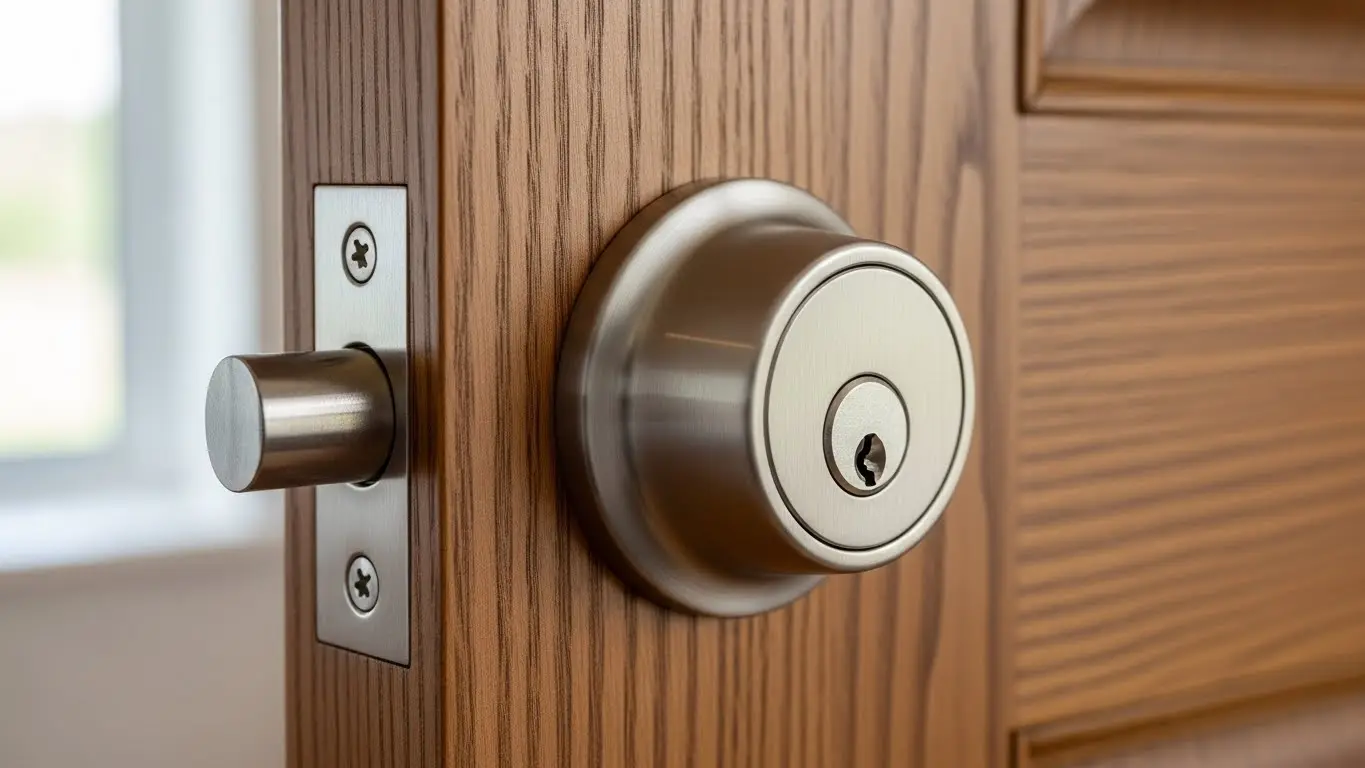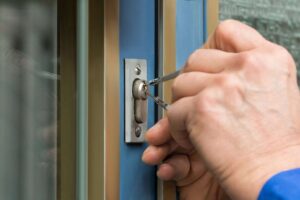Mechanical deadbolts have been a cornerstone of home security for decades. They are known for their durability, simplicity, and ability to provide strong physical protection for entry doors. In Philadelphia, homeowners often rely on deadbolts to safeguard their property, but as security threats evolve and smart home technology becomes more common, many are asking whether traditional deadbolts are enough to protect their homes today. Lock installation in Philadelphia now combines traditional mechanical options with advanced security solutions, giving homeowners the flexibility to create a secure environment that meets modern needs.
Understanding how mechanical deadbolts work, their advantages, limitations, and how they compare to newer smart locks can help homeowners make informed decisions about their home security.
How Mechanical Deadbolts Work
Mechanical deadbolts function by extending a solid metal bolt into the door frame, creating a strong barrier against unauthorized entry. Unlike spring locks, deadbolts cannot be easily jimmied or forced open. Their strength comes from both the bolt itself and the hardware securing it into the door frame. Proper installation is crucial because even the highest-quality deadbolt can be compromised if it is not fitted correctly.
Deadbolt lock types vary depending on security needs:
-
Single-cylinder deadbolts: Operated with a key on the outside and a thumb turn on the inside, suitable for most residential doors.
-
Double-cylinder deadbolts: Require a key on both sides, ideal for doors with glass panels to prevent break-ins but may complicate emergency exits.
-
High-security deadbolts: Feature anti-drill, anti-bump, and anti-pick mechanisms for maximum resistance.
Professional lock installation in Philadelphia ensures that the correct type of deadbolt is selected and properly fitted to maximize security.
Benefits of Mechanical Deadbolts
Mechanical deadbolts remain widely used for several reasons. They are simple, reliable, and long-lasting, providing homeowners with peace of mind without relying on electricity or batteries. Unlike electronic locks, mechanical deadbolts have fewer points of failure, making them particularly dependable during emergencies.
Other benefits include:
-
Physical strength: A solid metal bolt resists forceful entry, making it a reliable barrier against break-ins.
-
Cost-effectiveness: Rekeying or installing a mechanical deadbolt is typically more affordable than upgrading to a fully smart security system.
-
Compatibility: They fit standard doors and require minimal maintenance, which makes them accessible to most homeowners.
Mechanical deadbolts are a practical solution for anyone who wants a secure and straightforward locking system.
Are Deadbolts Enough in Today’s Security Landscape
While mechanical deadbolts provide strong physical protection, it is important to recognize their limitations. Modern burglars may use sophisticated techniques such as lock bumping, lock picking, or brute force attacks. In addition, doors with weak frames, cheap hardware, or glass panels can make even the strongest deadbolt vulnerable.
Homeowners can enhance deadbolt effectiveness by:
-
Ensuring proper installation with long screws anchoring the strike plate into the door frame.
-
Reinforcing doors with solid cores or metal plates.
-
Pairing mechanical deadbolts with additional security features such as alarms or surveillance systems.
With these measures, mechanical deadbolts continue to provide a reliable first line of defense.
Deadbolt vs Smart Lock
Smart locks have become increasingly popular, offering advanced features like keyless entry, temporary access codes, and integration with home security systems. Comparing deadbolt vs smart lock highlights key differences:
-
Mechanical deadbolts: Dependable, simple, and resistant to electronic attacks. They provide a proven method of physical security.
-
Smart locks: Offer convenience, remote access, and integration with smart home devices, but may require maintenance and battery replacement.
-
Hybrid approach: Many homeowners use both mechanical deadbolts and smart locks to combine the physical strength of traditional locks with modern technological advantages.
This approach ensures homes benefit from the reliability of mechanical deadbolts while gaining the convenience of smart technology.
Read More: 5 Common Lock Issues Homeowners Face and How to Fix Them
Choosing the Best Deadbolts for Home Security
Selecting the best deadbolts for home security is critical for maximizing protection. Factors to consider include:
-
Material quality: Hardened steel bolts resist drilling and forced entry.
-
Lock certifications: Look for locks that meet recognized security standards.
-
Professional installation: Lock installation in Philadelphia ensures proper alignment, secure strike plates, and overall functionality.
-
Door reinforcement: Strong doors and frames complement the deadbolt, making it more resistant to attack.
High-quality deadbolts installed by professionals provide strong, reliable security for any home.
Types of Deadbolt Locks
Different deadbolt lock types cater to various security requirements. Understanding these helps homeowners choose wisely:
Single-cylinder deadbolts
This is the standard choice for most residential doors, operated with a key on the outside and a thumb turn on the inside. They provide reliable security for homes without glass panels near the lock, making them a simple and effective option for everyday use.
Double-cylinder deadbolts
These require a key on both the exterior and interior sides, offering extra protection for doors with glass panels or windows nearby. While they increase security, homeowners should be cautious in emergencies, as exiting may require locating the key quickly.
Lockable thumb-turn deadbolts
These allow you to lock or unlock the door from the inside using a thumb turn, which can also be locked from the outside with a key. They offer flexible security and are useful for households where quick interior locking is needed without compromising exterior access.
High-security deadbolts
Designed with anti-bump, anti-drill, and reinforced features, these deadbolts provide maximum resistance against forced entry. They are ideal for homes in high-risk areas or for homeowners who want the strongest possible physical protection for their doors.
Professional guidance ensures homeowners select the appropriate deadbolt type for their home layout, risk factors, and security needs.
Why Professional Lock Installation Matters
Even the highest-quality deadbolt can fail if installed incorrectly. Proper lock installation in Philadelphia includes:
-
Aligning the bolt precisely with the strike plate.
-
Reinforcing the door frame with long screws for durability.
-
Ensuring a snug fit to maximize resistance against force.
Professional installation guarantees that deadbolts function optimally and maintain the highest level of security.
Integrating Deadbolts with Home Security Systems
Mechanical deadbolts can be integrated with broader security measures for enhanced protection:
-
Door sensors and alarms alert homeowners to unauthorized entry attempts.
-
Surveillance cameras provide monitoring and evidence in case of attempted break-ins.
-
Smart lock integration allows remote control while retaining mechanical backup.
Combining deadbolts with other security measures creates multiple layers of protection, making homes safer against a variety of threats.
Common Misconceptions About Deadbolts
-
Deadbolts are outdated: When installed properly, they remain highly effective.
-
All deadbolts are equally secure: Quality, type, and installation make a significant difference.
-
Smart locks make deadbolts unnecessary: Many homeowners benefit from using both mechanical and smart solutions for enhanced security.
Understanding these points helps homeowners make informed decisions about securing their homes.
Reinforcing Doors for Maximum Security
A strong deadbolt alone is not sufficient if the door is weak. Homeowners should consider:
-
Solid-core doors to resist forced entry.
-
Reinforced strike plates and long screws.
-
Additional precautions for doors with glass panels.
Reinforcing doors along with mechanical deadbolts strengthens overall security and provides peace of mind.
Making the Decision: Mechanical Deadbolts or Smart Locks
Choosing between mechanical deadbolts and smart locks depends on several factors:
-
Neighborhood crime rates and property risk.
-
Door type, layout, and materials.
-
Homeowner preferences for convenience versus traditional physical security.
A combination of mechanical deadbolts and smart technology often provides the best balance between reliability, protection, and modern convenience.
Strengthening Home Security with Professional Assistance
Mechanical deadbolts continue to be a cornerstone of home security, offering durability, reliability, and strong resistance to forced entry. Proper lock installation, reinforced doors, and integration with smart security systems maximize their effectiveness. For professional lock installation in Philadelphia, Kingstone Locksmith Philadelphia provides expert services including mechanical deadbolts, high-security lock solutions, and tailored home security consultations. Their experienced team ensures your locks deliver maximum protection while maintaining convenience and reliability.






